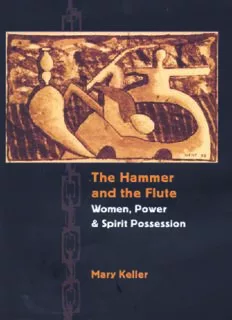
The Hammer and the Flute: Women, Power, and Spirit Possession PDF
Preview The Hammer and the Flute: Women, Power, and Spirit Possession
TheHammerandtheFlute The Hammer and the Flute Women, Power, and Spirit Possession Mary Keller TheJohnsHopkinsUniversityPress Baltimore&London TheJohnsHopkinsUniversityPress Allrightsreserved.Published PrintedintheUnitedstatesofAmericaonacid-freepaper TheJohnsHopkinsUniversityPress NorthCharlesStreet Baltimore,Maryland- www.press.jhu.edu LibraryofCongressCataloging-in-PublicationData Keller,Mary,– Thehammerandtheflute:women,power,andspiritpossession/ MaryKeller. p. cm. Includesbibliographicalreferencesandindex. ---(alk.paper) .Spiritpossession..Women—Religiouslife. I.Title. . .(cid:1)—dc AcatalogrecordforthisbookisavailablefromtheBritishLibrary Contents Preface vii Introduction Part. ReorientingPossessioninTheory Chapter.SignifyingPossession Chapter.ReorientingPossession Chapter.Flutes,Hammers,andMountedWomen Part. TheWork,War,andPlayofPossession Chapter.Work Chapter.War Chapter.Play(s) Conclusion Notes Bibliography Index Preface Thisbookisamethodologicalargumentabouthowcontemporaryscholar- shipapproachesbodiesthatarepossessedbyancestors,deities,orspirits.It beganasaquestionoffeministhistoriography whenIwasfirstintroduced to Greek maenads during a seminar with Professor Patricia Cox Miller on genderinGreekantiquity:Howmightoneevaluatetheagencyofawoman’s bodyinfifth-centuryAthensthatispossessed;abodythatisrunningfreely and not confined to a traditional women’s space but “free” only because it isabodythatisovercomebyadivineagency?Whatbeganasaproblemfor feministhistoriographythenenteredintoaninterdisciplinaryconversation with contemporary anthropology, psychology, and sociology as I became aware of the extensive literature on spirit possession. Most contemporary examples of possession are found where indigenous traditions are still strong, either in rural areas or among immigrant communities in urban areas. Possessed bodies are extremely different from the contemporary Western model of proper subjectivity. They are volatile bodies that attract the eye of observers, and often their volatility is related to erotic or outra- geousactivity.Possessedbodiesarenotindividualbodies.Theyarenotoften held personally responsible for their actions by their communities. Within their communities, possessed bodies are rigorously scrutinized in order to determinethatinfactanancestor,deity,orspirithadovercomethem;how- ever, that is an interpretation that would be difficult if not impossible for mostscholarstorepresentasthe“truth”ofthematter.Byandlarge,schol- arly approaches to possessed bodies have reinterpreted them as repressed psychological bodies, oppressed sociological bodies, or oppressed women’s viii Preface bodies.WhatIhavetriedtodoistodeliverareligiousstudiesapproachto these bodies that can incorporate indigenous interpretations into a mean- ingful,criticalinterpretationofthepowerrelationshipsthesebodiesnego- tiate. As I look back to the history that produced my engagement with pos- sessed bodies, I want to thank the incredible collection of teachers that broughtmetothisniche,whichliesattheintersectionoffeministphiloso- phyandcriticalmethodologyinthestudyofreligion.Frommyintroduction tofeministtheorywithWendyBrownandRosemaryTongtotheintroduc- toryunitsinreligious studiesrunbyMarkC.Taylor andH.GanseLittle, Jr.,fromJewishfeminismwithJudithWegnertogenderstudiesinJudaism with Charlotte Fonrobert via Daniel Boyarin, from history of religions methodologywithCharlesLongandJorunnBuckleytopostmoderntheol- ogywithMarkTaylorandCharlieWinquist,fromnothingnesswithDavid MillertoemptinesswithDickPilgrim,Ihavehadanincredibleopportunity tostudywithpeoplewhoseintellectualconcernsinspiredme. Morespecifically,theresearchinthisbookwasfirstpursuedasadisser- tationthatbeganwhenIwastakingcoursesinGreekantiquitywithPatricia Miller simultaneously with an anthropology and postcolonial theory unit taught by Ann G. Gold—both of which included stories about possessed women. Professor Miller supported the development of my argument—a task that required her to give extensive feedback, which she did so rigor- ously and graciously. Ann Gold read and commented upon several papers anddraftsofchapters,alwaysofferingsupportandprovidingacriticalread- ingofthetheoryIwasusingbasedonherexhaustivestudyandexperience of the practice of anthropology. Professor Phillip Arnold’s lecture to the department on “place” was important as I thought about the place-taking oftheMalaysianspiritsdiscussedinChapter,“Work,”andalsotheimpor- tanceoflandandtheShonaancestorsdiscussedinChapter,“War.”Pro- fessorMicereMugotook timetolistentomyideas andthenfatefullytold meoftheNehandamhondoroinZimbabwe,openingupanewareaofstudy thatwasfartoocompellingtoleavebehind.InpursuitofresearchintoAfri- can traditional religions I received information from Christina Le Doux, subjectlibrarianforgenderstudiesattheUniversityofSouthAfrica.Claire JonesoftheUniversityofWashingtonandDouglasDzivafromtheUniver- sityofNatalbothreadearlierdraftsofChapterandgenerouslyprovided Preface ix me with technical as well as methodological critiques. Douglas kindly shared sections of his dissertation manuscript, and both scholars provided memuch-neededsupportasIsteppedintotheirareasofexpertise.Chapter ,“Play(s),”wasinfluencedbyProfessorDavidMiller’splayonlecturesand lectures on play. ProfessorKen Frieden read an earlier draftof the section on TheDybbuk, which was also a new area of research for me. His careful critique and advice regarding technical as well as methodological issues in the study of Yiddish arts were very helpful. I take his concern seriously about the problems raised when nonspecialists draw from resources that requirenuancedanddevelopedstudy. TheriskIhavetakeninthisbookistoraiseaveryspecificquestionabout how scholars represent and evaluate the agency of possessed bodies, and I have applied the question to areas of study in which I am not an expert. I would like to think that I have asked my question well enough that it will beofinteresttothosepeoplewhoareexpertsandwhocanengagewithmy argument, bringing it to greater precision and depth. What is exciting for me is that the unique linguistic, geographical, historical, and cultural ele- mentsofeachplaceinwhichIhavestudiedpossessedwomenbroadenthe horizonsbywhichonecanconceiveofsubjectivity;thisisanareathatfur- ther scholarly research and argumentcan bring to greater accuracy. I have benefitedfromtheexpertiseofothersasIpursuedmyresearch;anyshort- comingsaremyown. Therehavebeenmanyimportant friendsandcolleagueswhosesupport was vital for health and sanity and also for their questions and critiques. TheseincludeJudithPoxon,RobertGlass,YiannaLiatsos,CorinneDemp- seyCorigliano,CraigBurgdoff,HeathAtchley,MehnazAfridi,JudyClark, KathrynLanier,SebrenaMcBean,DeanDavidPotter,NancyVedder,Di- onne Smith, and the gang in the academic advising office where I worked fortwoyears.IbeganmyfirstteachingpositionattheUniversityofStirling in Scotland as I finished this manuscript and want to thank the Religious Studies Department for their support. While the larger university system in Britain is driven to distraction by RAE deadlines, which for the sake of measuring research output push scholars to publish before they feel their manuscripts are ready, Keith Whitelam and Richard King as my heads of department continued to express their confidence in this project and en- couragedmetofocusmyenergiesoncompletionofthemanuscript.Richard
Description: